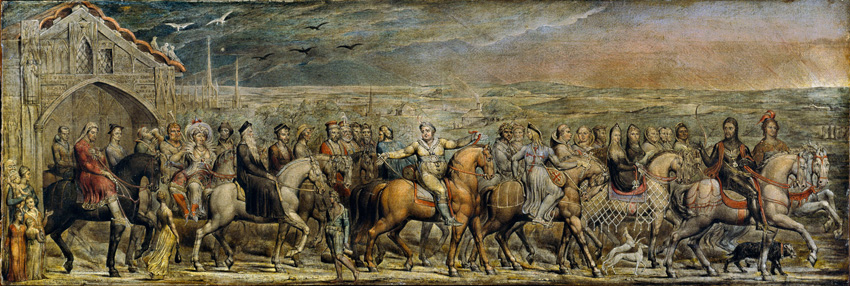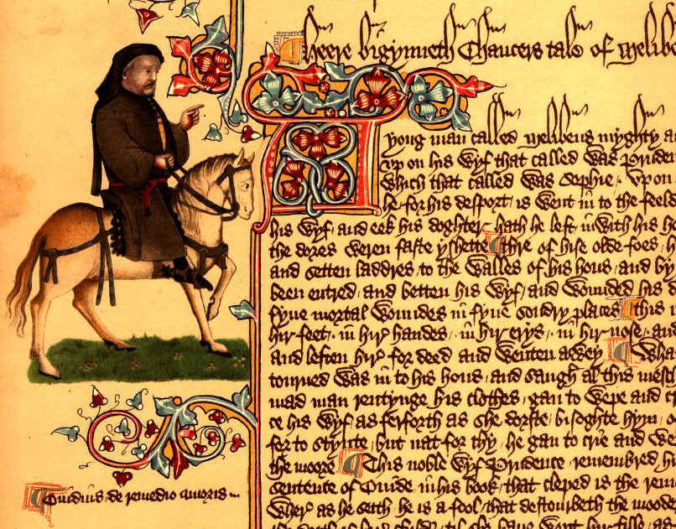Good morning, class.
In college, back when I was a student (just like you!), I took a class called Chaucer and Medieval Literature—over half of our class time was dedicated to The Canterbury Tales. Chaucer only completed 22 of the “tales,” which is about one-fifth of the full-length compilation he planned to write. That class was hard enough as it was, so I can’t imagine it multiplied by five.
But I liked studying The Canterbury Tales (sometimes more than reading it). It’s intricate, boundary-breaking, and foundational for just about every major piece of literature after it. It’s actually comparable to the Bible—for all it’s culturally-insensitive flaws, it is one of the building blocks of modern literature.
Just make sure someone’s there to help you understand it, like a professor. A real professor. Not a blogger. And please, just avoid the Middle English if you know what’s good for you.

The Canterbury Tales is about a lot of stuff, but it’s mostly about telling stories. A group of pilgrims are journeying to Canterbury, and they tell each other stories to pass the time—whoever tells the best story wins the competition. It’s a little mundane, but the stories they tell are diverse and multifaceted. Many of the tales are crude, especially those that use rape as a comic plot device. It’s always hard to look past. But a handful of these stories are, simply put, good. My favorites are the Wife of Bath’s Tale, the Pardoner’s Tale, and the Nun’s Priest’s Tale.
The Wife of Bath’s Tale is one of the most feminist things medieval literature has to offer—it even holds up well today. After a knight’s rape of a girl, his punishment is to go out and find what women want most. A woman he meets claims to know the answer, but he must give her something in return—he must marry her. He agrees, but instantly regrets it because of her age and poverty. But she proves to him what she claims women want: sovereignty—power over men, which men consistently have over women. She gives him a choice between two options, neither of which he wants, so he tells her to decide, which she wanted all along.
The Pardoner’s Tale is probably my favorite—when I read it in high school, I recognized it instantly as the inspiration for “The Tale of the Three Brothers” in the Harry Potter franchise. Three men set out to conquer Death, and they come across a treasure that they won’t share. They each end up killing each other out of greed, and Death takes each of them without hesitation.
The Nun’s Priest’s Tale is probably the most genuinely enjoyable of the tales—it’s about a talking rooster who has a dream about his eminent death by a fox. He is convinced that it’s a sign, but his hen convinces him otherwise. He goes about his business, and when a fox actually does catch him, the rooster outsmarts the fox and escapes, making for a happy ending.

The Canterbury Pilgrims, Blake, William (1757 – 1827, English)
There are a lot of good high school English reasons to read The Canterbury Tales. Historical context, frame story, character study, themes and symbols…I can already see the unit plan. It’s just a good piece of literature to study.
But I like to think there’s a good reason to read it, in the same way one would read any other book on the 50-books list. As luck would have it, my previous book provides the answer—Life of Pi by Yann Martel. The climax of Life of Pi involves the choice between two stories, and which one is “better.” That’s the crux of the competition in The Canterbury Tales—choosing the best story.
This isn’t the kind of story you read on a Saturday curled up in a comfy chair…it’s the kind of story that you study and slave over. But it proves that big, important literature is on the same level as your comfy-chair-book. The Canterbury Tales is a big, epic-scale piece of literature about the importance of stories. Stories guide us and nurture us, and they reach out to us across time and space to give us meaning. There are many novels that can help you see that, but Geoffrey Chaucer made it happen first.
Up next, I’m trying The Color Purple by Alice Walker. I’ve never read it before, so I’m walking into it blind. It’s been a while since I’ve done that with a book, so I’m definitely excited!
Until next time,
Prof. Jeffrey

Recent Comments